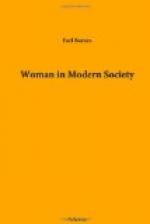There are two ways to explain the fact that, after fifteen years of political experience, the women of Boise voted in large numbers for license and for a policy in handling the red light district which they knew would mean a return to police control. In the first place, it may be said that fifteen years of steady contact with political life had blunted the sensibilities of women and dulled their moral feeling. On the other hand, it may be held that practical experience, under the steady pressure of responsibility, had made them realize the difficulties involved in the handling of these great social problems and had made them feel that a law which could command the support of public opinion, even though it regulated these difficulties, was better than a law which they might consider ideal, but which was incapable of execution.
In Idaho, as in Colorado, the payment of women political workers seems to have become a rather wide-spread abuse. Under the conditions of the State, with many new settlers constantly arriving, it has long been thought necessary to employ paid workers to register voters, get them out on election-day and influence those who are uncertain. After 1896, women were often hired to do this work, and were paid from three to five dollars a day. With their weak sense of party affiliation, it is claimed that they will work for the party that pays best. A candidate with plenty of money may hire so many workers that it becomes a system of wholesale bribery. It is universally conceded that this is an abuse, and that many women look upon election service as a source of pin money to a degree that is undesirable. Meantime, practical politicians assured me that it was a system the women found in operation when they came in; that far more men than women were paid; and that the abuse could be corrected by proper legislation.
To summarize the matter, we may say that equal suffrage in Idaho has simply accentuated the movement toward setting women free to live their individual lives which general education and participation in industrial life has already carried so far all over the country. Equal suffrage is accepted there, as the higher education of women is accepted in Massachusetts, and the results in the two cases have been much the same.
Surely these reports carry the matter beyond the experimental stage. Conditions in Colorado and Idaho are not identical with those in the East, but they are similar enough to make the experience of these States amount to a demonstration. Meantime the new obligation resting on women is profound. They must learn to “sweat their tempers and learn to know their man.” They must become students of public affairs and of institutional life. Old issues are past; and equal suffrage will soon prevail everywhere. Women, like men, have more “rights” in our modern democracies than they can use. Woman’s Rights are largely realized; from now on we must front Woman’s Duties.




